
List of Scottish consorts
Encyclopedia
The Royal Consort of Scotland was the spouse
of the Monarch of Scotland. The Kingdom of Scotland
was first unified as a state
by Kenneth I of Scotland
in 843, and ceased to exist as an independent kingdom
in 1707, when it was merged with the Kingdom of England
to become the Kingdom of Great Britain
.
The early history of Scotland is confused and often obscure, due largely to information given by the sources of the time and after, which are often contradictory, vague, and lacking in detail. Details of the kings prior to Malcolm III are sparse, and the status of two – Giric
and Eochaid
– dubious; details of their wives are almost non-existent. Thus, it is practically impossible to construct a list of consorts of Scotland prior to the accession of Macbeth
, about whose wife Gruoch
more is known.
House of Moray
Although a few details of earlier queens consort are known – for example, Duncan I was married to a woman named in one source as Suthen – the first queen about whom much is known is Gruoch, a daughter of Boite mac Cináeda, himself a son of either Kenneth II
or Kenneth III
. Her son was Lulach
; the mother of Máel Snechtai of Moray
, Lulach's son, was still alive in 1078, when she was seized by Malcolm III Long-neck, but nothing else is known of her, not even if she and Lulach were married.
overthrew his cousin, Lulach, and reclaimed the Scottish throne for himself. His family, the House of Dunkeld, would rule until the death of Alexander III in 1286, with whom the House ended. Alexander's heir was his infant granddaughter, Margaret, "the Maid of Norway"
, of the House of Fairhair; but she died, still unmarried and childless, in late 1290 before reaching Scotland, and was never crowned at Scone. After two years of Interregnum, the controversial John de Balliol was chosen as king (his wife was already dead, and never became queen consort); but after four years of reign, he abdicated, and Scotland entered another Interregnum until 1306.
would rule not only Scotland but also England and Ireland until 1714. However, the final Stewart monarch was a woman, Anne of the United Kingdom.
, a member of a junior branch of the Stewart family (who had also gallicised their surname to Stuart). Their son, James VI, established the Stuart dynasty, which would rule not only Scotland but also England and Ireland. Their rule was briefly terminated with the Civil War, in which Charles I was executed and the Commonwealth declared; between 1649 and 1660, England, Scotland and Ireland were ruled by Parliament, dominated by Oliver Cromwell.
, refusing to accept the Act of Union, claimed the English and Scottish thrones, as did his son Charles Edward Stuart
; however, they are not considered legitimate Kings of Scotland, since they never effectively secured their claims, and so their wives are not listed here.
For the subsequent consorts of Great Britain and the United Kingdom, see List of British consorts.
Marriage
Marriage is a social union or legal contract between people that creates kinship. It is an institution in which interpersonal relationships, usually intimate and sexual, are acknowledged in a variety of ways, depending on the culture or subculture in which it is found...
of the Monarch of Scotland. The Kingdom of Scotland
Kingdom of Scotland
The Kingdom of Scotland was a Sovereign state in North-West Europe that existed from 843 until 1707. It occupied the northern third of the island of Great Britain and shared a land border to the south with the Kingdom of England...
was first unified as a state
Sovereign state
A sovereign state, or simply, state, is a state with a defined territory on which it exercises internal and external sovereignty, a permanent population, a government, and the capacity to enter into relations with other sovereign states. It is also normally understood to be a state which is neither...
by Kenneth I of Scotland
Kenneth I of Scotland
Cináed mac Ailpín , commonly Anglicised as Kenneth MacAlpin and known in most modern regnal lists as Kenneth I was king of the Picts and, according to national myth, first king of Scots, earning him the posthumous nickname of An Ferbasach, "The Conqueror"...
in 843, and ceased to exist as an independent kingdom
Monarchy
A monarchy is a form of government in which the office of head of state is usually held until death or abdication and is often hereditary and includes a royal house. In some cases, the monarch is elected...
in 1707, when it was merged with the Kingdom of England
Kingdom of England
The Kingdom of England was, from 927 to 1707, a sovereign state to the northwest of continental Europe. At its height, the Kingdom of England spanned the southern two-thirds of the island of Great Britain and several smaller outlying islands; what today comprises the legal jurisdiction of England...
to become the Kingdom of Great Britain
Kingdom of Great Britain
The former Kingdom of Great Britain, sometimes described as the 'United Kingdom of Great Britain', That the Two Kingdoms of Scotland and England, shall upon the 1st May next ensuing the date hereof, and forever after, be United into One Kingdom by the Name of GREAT BRITAIN. was a sovereign...
.
The early history of Scotland is confused and often obscure, due largely to information given by the sources of the time and after, which are often contradictory, vague, and lacking in detail. Details of the kings prior to Malcolm III are sparse, and the status of two – Giric
Giric of Scotland
Giric mac Dúngail was a king of the Picts or the king of Alba. The Irish annals record nothing of Giric's reign, nor do Anglo-Saxon writings add anything, and the meagre information which survives is contradictory...
and Eochaid
Eochaid of Scotland
Eochaid mac Run, known in English simply as Eochaid, may have been king of the Picts from 878 to 889. He was a son of Run, King of Strathclyde, and his mother may have been a daughter of Kenneth MacAlpin...
– dubious; details of their wives are almost non-existent. Thus, it is practically impossible to construct a list of consorts of Scotland prior to the accession of Macbeth
Macbeth of Scotland
Mac Bethad mac Findlaích was King of the Scots from 1040 until his death...
, about whose wife Gruoch
Gruoch of Scotland
Gruoch ingen Boite was the daughter of Boite mac Cináeda son of Cináed III. She is most famous for being the wife and queen of Mac Bethad mac Findlaích . The dates of her life are not certainly known....
more is known.
House of MorayHouse of MorayThe so-called House of Moray is a historiographical and genealogical construct to illustrate the succession of rulers whose base was at the region of Moray and who ruled sometimes a larger kingdom...
Although a few details of earlier queens consort are known – for example, Duncan I was married to a woman named in one source as Suthen – the first queen about whom much is known is Gruoch, a daughter of Boite mac Cináeda, himself a son of either Kenneth IIKenneth II of Scotland
Cináed mac Maíl Coluim was King of Scots...
or Kenneth III
Kenneth III of Scotland
Cináed mac Duib anglicised as Kenneth III, and nicknamed An Donn, "the Chief" or "the Brown", was King of Scots from 997 to 1005. He was the son of Dub...
. Her son was Lulach
Lulach of Scotland
Lulach mac Gille Coemgáin was King of Scots between 15 August 1057 and 17 March 1058.He appears to have been a weak king, as his nicknames suggest...
; the mother of Máel Snechtai of Moray
Máel Snechtai of Moray
Máel Snechtai of Moray was the ruler of Moray, and, as his name suggests, the son of Lulach, King of Scotland.He is called on his death notice in the Annals of Ulster, "Máel Snechtai m...
, Lulach's son, was still alive in 1078, when she was seized by Malcolm III Long-neck, but nothing else is known of her, not even if she and Lulach were married.
| Picture | Name | House | Birth | Marriage | Became consort | Coronation | Ceased to be consort | Death | Spouse |
|---|---|---|---|---|---|---|---|---|---|
| Gruoch of Scotland Gruoch of Scotland Gruoch ingen Boite was the daughter of Boite mac Cináeda son of Cináed III. She is most famous for being the wife and queen of Mac Bethad mac Findlaích . The dates of her life are not certainly known.... |
Boite mac Cináeda (MacAlpin House of Alpin The House of Alpin is the name given to the kin-group which ruled in Pictland and then the kingdom of Alba from the advent of Cináed mac Ailpín in the 840s until the death of Máel Coluim mac Cináeda in 1034.... ) |
? | after 1032 | c.14 August 1040 | – | 15 August 1057 | ? | Macbeth Macbeth of Scotland Mac Bethad mac Findlaích was King of the Scots from 1040 until his death... |
|
| Picture | Name | House | Birth | Marriage | Became consort | Coronation | Ceased to be consort | Death | Spouse |
House of Dunkeld (1058–1286)
In 1058, Malcolm Long-neck of the House of DunkeldHouse of Dunkeld
The so-called House of Dunkeld, in Scottish Gaelic Dùn Chailleann , is a historiographical and genealogical construct to illustrate the clear succession of Scottish kings from 1034 to 1040 and from 1058 to 1290.It is dynastically sort of a continuation to Cenél nGabráin of Dál Riata, "race of...
overthrew his cousin, Lulach, and reclaimed the Scottish throne for himself. His family, the House of Dunkeld, would rule until the death of Alexander III in 1286, with whom the House ended. Alexander's heir was his infant granddaughter, Margaret, "the Maid of Norway"
Margaret, Maid of Norway
Margaret , usually known as the Maid of Norway , sometimes known as Margaret of Scotland , was a Norwegian princess who was Queen of Scots from 1286 until her death...
, of the House of Fairhair; but she died, still unmarried and childless, in late 1290 before reaching Scotland, and was never crowned at Scone. After two years of Interregnum, the controversial John de Balliol was chosen as king (his wife was already dead, and never became queen consort); but after four years of reign, he abdicated, and Scotland entered another Interregnum until 1306.
| Picture | Name | House | Birth | Marriage | Became Consort | Coronation | Ceased to be Consort | Death | Spouse |
|---|---|---|---|---|---|---|---|---|---|
| Ingibiorg Finnsdottir Ingibiorg Finnsdottir Ingibiorg Finnsdottir was a daughter of Earl Finn Arnesson and Bergljot Halvdansdottir , a niece of the Norwegian Kings Saint Olaf and Harald Hardraade. She is also known as Ingibiorg, the Earls'-Mother. The dates of her life are not certainly known.She married Thorfinn Sigurdsson, Earl of Orkney... |
Finn Arnesson Finn Arnesson Finn Arnesson was a Norwegian nobleman and advisor to both King Olaf II of Norway and King Harald III of Norway and later served King Sweyn II of Denmark... |
? | ? | 1058? | – | 1058/69? | Malcolm III Malcolm III of Scotland Máel Coluim mac Donnchada , was King of Scots... |
||
 |
Margaret of Wessex Saint Margaret of Scotland Saint Margaret of Scotland , also known as Margaret of Wessex and Queen Margaret of Scotland, was an English princess of the House of Wessex. Born in exile in Hungary, she was the sister of Edgar Ætheling, the short-ruling and uncrowned Anglo-Saxon King of England... |
Edward the Exile Edward the Exile Edward the Exile , also called Edward Ætheling, son of King Edmund Ironside and of Ealdgyth. After the Danish conquest of England in 1016 Canute had him and his brother, Edmund, exiled to the Continent... (Wessex House of Wessex The House of Wessex, also known as the House of Cerdic, refers to the family that ruled a kingdom in southwest England known as Wessex. This House was in power from the 6th century under Cerdic of Wessex to the unification of the Kingdoms of England.... ) |
c.1045 | 1070 | – | 13 November 1093 | 16 November 1093 | ||
| Ethelreda of Northumbria | Gospatric, Earl of Northumbria Gospatric, Earl of Northumbria Gospatric or Cospatric , , was Earl of Northumbria, or of Bernicia, and later lord of sizable estates around Dunbar... |
? | 1093/94 | – | 1094 | ? | Duncan II Duncan II of Scotland Donnchad mac Maíl Coluim was king of Scots... |
||
| Sybilla of Normandy | Henry I of England Henry I of England Henry I was the fourth son of William I of England. He succeeded his elder brother William II as King of England in 1100 and defeated his eldest brother, Robert Curthose, to become Duke of Normandy in 1106... (Normandy) |
1092 | 1107 | – | 12/13 July 1122 | Alexander I Alexander I of Scotland Alexander I , also called Alaxandair mac Maíl Coluim and nicknamed "The Fierce", was King of the Scots from 1107 to his death.-Life:... |
|||
| Maud of Northumbria | Waltheof II, Earl of Northumbria | 1074 | 1113 | April/May 1124 | – | 1130 | David I David I of Scotland David I or Dabíd mac Maíl Choluim was a 12th-century ruler who was Prince of the Cumbrians and later King of the Scots... |
||
| Ermengarde de Beaumont Ermengarde de Beaumont Ermengarde de Beaumont , was a Queen Consort of the Kingdom of Scotland.-Life:Ermengarde was born c. 1170 to Richard I, Viscount de Beaumont-le-Vicomte, de Fresnay et de Ste-Suzanne , and wife Lucie de l'Aigle , daughter of Richard II de l'Aigle... |
Richard I, Viscount de Beaumont (Beaumont House of Beaumont The Norman family of Beaumont was one of the great baronial Anglo-Norman families which became rooted in England after the Norman conquest.Roger de Beaumont, lord of Pont-Audemer, of Beaumont-le-Roger, of Brionne and of Vatteville, was too old to fight at Hastings, staying in Normandy to govern... ) |
c.1170 | 5 September 1186 | – | 12 December 1214 | 12 February 1233/34 | William I William I of Scotland William the Lion , sometimes styled William I, also known by the nickname Garbh, "the Rough", reigned as King of the Scots from 1165 to 1214... |
||
| Joan of England | John of England John of England John , also known as John Lackland , was King of England from 6 April 1199 until his death... (Plantagenet House of Plantagenet The House of Plantagenet , a branch of the Angevins, was a royal house founded by Geoffrey V of Anjou, father of Henry II of England. Plantagenet kings first ruled the Kingdom of England in the 12th century. Their paternal ancestors originated in the French province of Gâtinais and gained the... ) |
22 July 1210 | 21 June 1221 | – | 4 March 1238 | Alexander II Alexander II of Scotland Alexander II was King of Scots from1214 to his death.-Early life:... |
|||
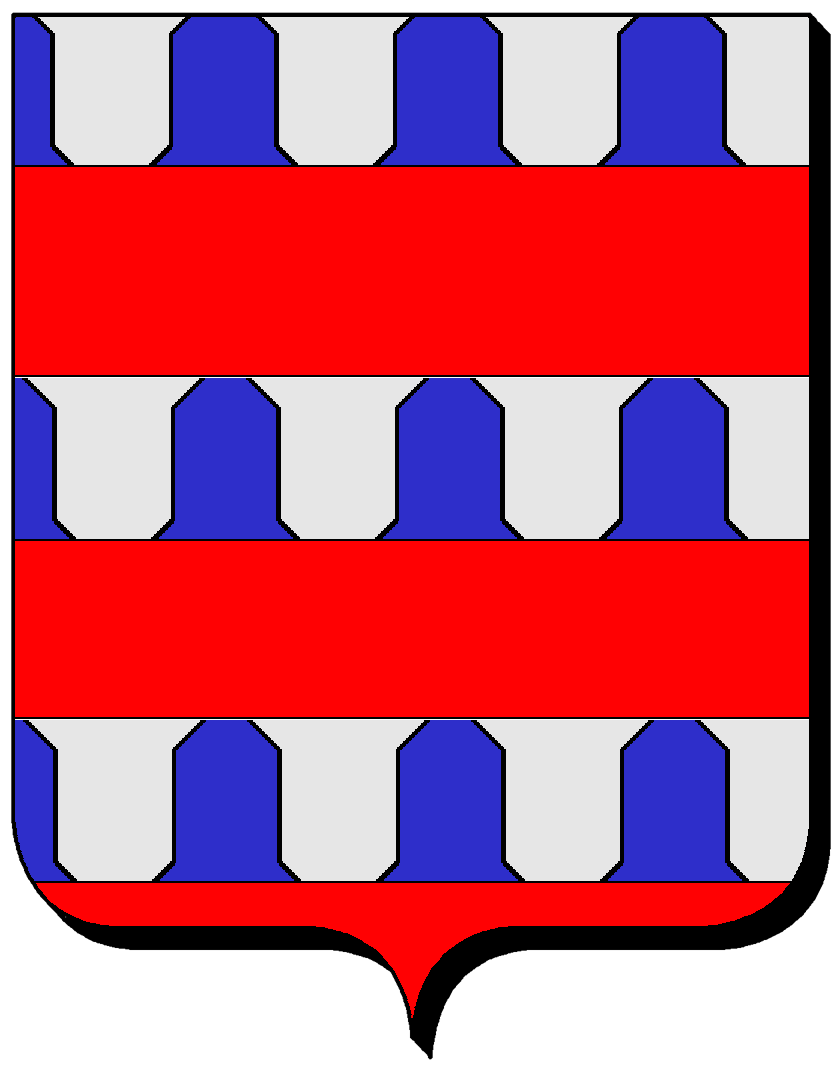 |
Marie de Coucy Marie de Coucy Marie de Coucy was the daughter of Enguerrand III, Lord of Coucy and his third wife Marie de Montmirel . She was Queen consort of the Kingdom of Scotland.- Biography :... |
Enguerrand III, Lord of Coucy Enguerrand III, Lord of Coucy Enguerrand III, Lord of Coucy was the eldest son and successor of Ralph I, Lord of Coucy. He succeeded as Lord of Coucy in 1191, and held it until his death; he was also lord of Marle and Boves.... (Coucy) |
c.1218 | 15 May 1239 | – | 6 July 1249 | 1285 | ||
| Margaret of England Margaret of England Margaret of England was a medieval English princess who became Queen of Scots. A daughter of the Plantagenet king Henry III of England and his queen, Eleanor of Provence, she was Queen consort to Alexander III "the Glorious", King of the Scots.- Family :She was the second child of Henry III of... |
Henry III of England Henry III of England Henry III was the son and successor of John as King of England, reigning for 56 years from 1216 until his death. His contemporaries knew him as Henry of Winchester. He was the first child king in England since the reign of Æthelred the Unready... (Plantagenet House of Plantagenet The House of Plantagenet , a branch of the Angevins, was a royal house founded by Geoffrey V of Anjou, father of Henry II of England. Plantagenet kings first ruled the Kingdom of England in the 12th century. Their paternal ancestors originated in the French province of Gâtinais and gained the... ) |
29 September 1240 | 26 December 1251 | 26 February 1275 | Alexander III Alexander III of Scotland Alexander III was King of Scots from 1249 to his death.-Life:... |
||||
| Yolande de Dreux | Robert IV, Count of Dreux (Dreux) |
c.1265 | 15 October 1285 | 19 March 1286 | 2 August 1330 | ||||
| Picture | Name | House | Birth | Marriage | Became consort | Coronation | Ceased to be consort | Death | Spouse |
House of Bruce (1306–1371) (Bruis)
In 1306, Robert the Bruce and his wife, Elizabeth de Burgh, were crowned King and Queen of Scots at Scone, ending the Scottish interregnum. The Bruce family would rule until the death of David II in 1371.| Picture | Name | House | Birth | Marriage | Became consort | Coronation | Ceased to be consort | Death | Spouse |
|---|---|---|---|---|---|---|---|---|---|
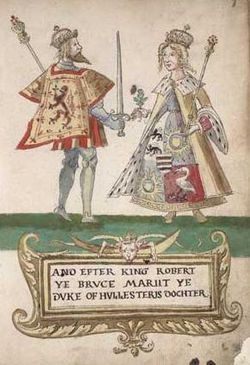 |
Elizabeth de Burgh Elizabeth de Burgh Elizabeth de Burgh was the second wife and the only queen consort of King Robert I of Scotland.-Life:She was born in Dunfermline, Fife in Scotland, the daughter of the powerful Richard Óg de Burgh, 2nd Earl of Ulster and his wife Margarite de Burgh... |
Richard Óg de Burgh, 2nd Earl of Ulster Richard Óg de Burgh, 2nd Earl of Ulster Richard Óg de Burgh, 2nd Earl of Ulster and 3rd Baron of Connaught , called The Red Earl, was one of the most powerful Irish nobles of the late 13th and early 14th centuries.-Early life:... (de Burgh Earl of Ulster The title of Earl of Ulster has been created several times in the Peerage of Ireland and Peerage of the United Kingdom. Currently, the title is a subsidiary title of the Duke of Gloucester, and is used as a courtesy title by the Duke's son, Alexander Windsor, Earl of Ulster... ) |
c.1289 | 1302 | 27 March 1306 | 27 October 1327 | Robert I Robert I of Scotland Robert I , popularly known as Robert the Bruce , was King of Scots from March 25, 1306, until his death in 1329.His paternal ancestors were of Scoto-Norman heritage , and... |
||
 |
Joan of England Joan of The Tower Joan of England , known as Joan of The Tower, was the first wife and Queen consort of king David II of Scotland.-Birth:... |
Edward II of England Edward II of England Edward II , called Edward of Caernarfon, was King of England from 1307 until he was deposed by his wife Isabella in January 1327. He was the sixth Plantagenet king, in a line that began with the reign of Henry II... (Plantagenet House of Plantagenet The House of Plantagenet , a branch of the Angevins, was a royal house founded by Geoffrey V of Anjou, father of Henry II of England. Plantagenet kings first ruled the Kingdom of England in the 12th century. Their paternal ancestors originated in the French province of Gâtinais and gained the... ) |
5 July 1321 | 17 July 1328 | 13 June 1329 | 7 November 1362 | David II David II of Scotland David II was King of Scots from 7 June 1329 until his death.-Early life:... |
||
 |
Margaret Drummond Margaret Drummond (Queen) Margaret Drummond was the second queen of David II of Scotland and a daughter of Sir Malcolm Drummond, Knt. by his wife Margaret, née Graham.... |
Sir Malcolm Drummond (Drummond Clan Drummond Clan Drummond is a Scottish clan deriving its name from the parish of Drymen, in what was western Stirlingshire. Legend gives Maurice of Hungary as founder of the clan... ) |
c.1340 | 20 February 1364 | 20 March 1369 Divorced by husband |
31 January 1375 | |||
| Picture | Name | House | Birth | Marriage | Became consort | Coronation | Ceased to be consort | Death | Spouse |
Direct line (1371–1542)
Upon the death of David II in 1371, his nephew, Robert Stewart (the son of Walter Stewart and Marjorie Bruce, herself the daughter of Robert I by his first marriage) acceded to the throne. His direct line of heirs would continue to rule until the death of his last direct descendant, James V. James left only a six-day old girl as his heir, prompting his angry exclamation, "The devil go with it! [The rule of the Stewarts] will end as it began. It came with a lass, and it will pass with a lass." In this he was wrong: Mary would marry a member of a junior branch of the Stewart family, and the line they foundedHouse of Stuart
The House of Stuart is a European royal house. Founded by Robert II of Scotland, the Stewarts first became monarchs of the Kingdom of Scotland during the late 14th century, and subsequently held the position of the Kings of Great Britain and Ireland...
would rule not only Scotland but also England and Ireland until 1714. However, the final Stewart monarch was a woman, Anne of the United Kingdom.
| Picture | Name | House | Birth | Marriage | Became consort | Coronation | Ceased to be consort | Death | Spouse |
|---|---|---|---|---|---|---|---|---|---|
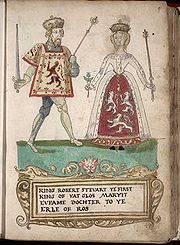 |
Euphemia de Ross Euphemia de Ross Euphemia de Ross was the second wife and first Queen consort of Robert II of Scotland.She was a daughter of Aodh, Earl of Ross and Margaret de Graham, Hugh's 2nd wife and daughter of Sir David de Graham of Montrose. She first married John Randolph, 3rd Earl of Moray but the marriage was childless... |
Aodh, Earl of Ross Aodh, Earl of Ross Hugh [probably Gaelic: Aodh], was the third successor of Ferchar mac in tSagairt as Mormaer of Ross .Hugh was a favorite of King Robert I of Scotland, who endowed him with many lands. Aodh even married Robert's sister, Maud... (Ross Clan Ross Clan Ross is a Highland Scottish clan. The original chiefs of the clan were the original Earls of Ross.-Origins:Clan Ross is a Highland Scottish clan first named as such by King Malcolm IV of Scotland in 1160... ) |
before 1333 | 2 May 1355 | 22 May 1371 | 1386 | Robert II Robert II of Scotland Robert II became King of Scots in 1371 as the first monarch of the House of Stewart. He was the son of Walter Stewart, hereditary High Steward of Scotland and of Marjorie Bruce, daughter of Robert I and of his first wife Isabella of Mar... |
||
 |
Anabella Drummond Anabella Drummond Anabella Drummond was the Queen Consort of Scotland as the wife of Robert III of Scotland.-Family:She was the daughter of Sir John Drummond, of Stobhall, near Perth, 11th Thane of Lennox and Chief of Clan Drummond, and Mary Montifex... |
John Drummond, 11th Thane of Lennox (Drummond Clan Drummond Clan Drummond is a Scottish clan deriving its name from the parish of Drymen, in what was western Stirlingshire. Legend gives Maurice of Hungary as founder of the clan... ) |
c.1350 | 1367 | August 1390 | 1401 | Robert III Robert III of Scotland Robert III was King of Scots from 1390 to his death. His given name was John Stewart, and he was known primarily as the Earl of Carrick before ascending the throne at age 53... |
||
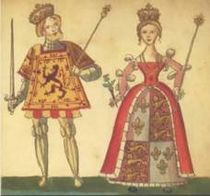 |
Joan Beaufort Joan Beaufort, Queen of Scotland Joan Beaufort was the Queen Consort of Scotland from 1424 to 1437 as the spouse of King James I of Scotland. During part of the minority of her son James II , she served as the Regent of Scotland.... |
John Beaufort, 1st Earl of Somerset John Beaufort, 1st Earl of Somerset John Beaufort, 1st Marquess of Somerset and 1st Marquess of Dorset, later only 1st Earl of Somerset, KG was the first of the four illegitimate children of John of Gaunt, 1st Duke of Lancaster, and his mistress Katherine Swynford, later his wife... (Beaufort Beaufort family The House of Beaufort is an English noble family, which originated in the fourteenth century and played an important role in the political struggles of the fifteenth century.... ) |
c.1404 | 2 February 1424 | 21 February 1437 | 15 July 1445 | James I James I of Scotland James I, King of Scots , was the son of Robert III and Annabella Drummond. He was probably born in late July 1394 in Dunfermline as youngest of three sons... |
||
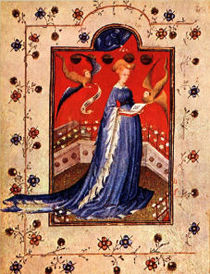 |
Mary of Guelders Mary of Guelders Mary of Guelders was the Queen Consort of Scotland as the wife of King James II of Scotland. She served as Regent of Scotland from 1460 to 1463.-Background:... |
Arnold, Duke of Guelders Arnold, Duke of Guelders Arnold of Egmond was Duke of Guelders, Count of Zutphen. He was son of John II of Egmond and Maria van Arkel.... (Egmond) |
c.1434 | 3 July 1449 | 3 August 1460 | 1 December 1463 | James II James II of Scotland James II reigned as King of Scots from 1437 to his death.He was the son of James I, King of Scots, and Joan Beaufort... |
||
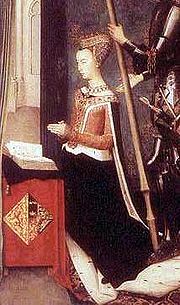 |
Margaret of Denmark | Christian I of Denmark Christian I of Denmark Christian I was a Danish monarch, king of Denmark , Norway and Sweden , under the Kalmar Union. In Sweden his short tenure as monarch was preceded by regents, Jöns Bengtsson Oxenstierna and Erik Axelsson Tott and succeeded by regent Kettil Karlsson Vasa... (Oldenburg House of Oldenburg The House of Oldenburg is a North German dynasty and one of Europe's most influential Royal Houses with branches that rule or have ruled in Denmark, Russia, Greece, Norway, Schleswig, Holstein, Oldenburg and Sweden... ) |
23 June 1456 | July 1469 | before 14 July 1486 | James III James III of Scotland James III was King of Scots from 1460 to 1488. James was an unpopular and ineffective monarch owing to an unwillingness to administer justice fairly, a policy of pursuing alliance with the Kingdom of England, and a disastrous relationship with nearly all his extended family.His reputation as the... |
|||
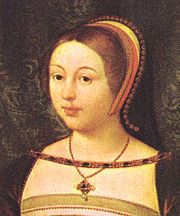 |
Margaret of England Margaret Tudor Margaret Tudor was the elder of the two surviving daughters of Henry VII of England and Elizabeth of York, and the elder sister of Henry VIII. In 1503, she married James IV, King of Scots. James died in 1513, and their son became King James V. She married secondly Archibald Douglas, 6th Earl of... |
Henry VII of England Henry VII of England Henry VII was King of England and Lord of Ireland from his seizing the crown on 22 August 1485 until his death on 21 April 1509, as the first monarch of the House of Tudor.... (Tudor) |
28 November 1489 | 8 August 1503 | 9 September 1513 | 18 October 1541 | James IV James IV of Scotland James IV was King of Scots from 11 June 1488 to his death. He is generally regarded as the most successful of the Stewart monarchs of Scotland, but his reign ended with the disastrous defeat at the Battle of Flodden Field, where he became the last monarch from not only Scotland, but also from all... |
||
 |
Madeleine of Valois | Francis I of France Francis I of France Francis I was King of France from 1515 until his death. During his reign, huge cultural changes took place in France and he has been called France's original Renaissance monarch... (Valois) |
10 August 1520 | 1 January 1537 | 7 July 1537 | James V James V of Scotland James V was King of Scots from 9 September 1513 until his death, which followed the Scottish defeat at the Battle of Solway Moss... |
|||
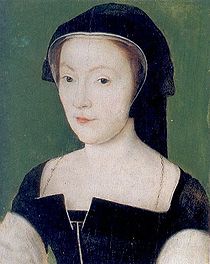 |
Mary of Guise Mary of Guise Mary of Guise was a queen consort of Scotland as the second spouse of King James V. She was the mother of Mary, Queen of Scots, and served as regent of Scotland in her daughter's name from 1554 to 1560... |
Claude, Duke of Guise Claude, Duke of Guise Claude de Lorraine, duc de Guise was a French aristocrat and general. He became the first Duke of Guise in 1528.... (Guise House of Guise The House of Guise was a French ducal family, partly responsible for the French Wars of Religion.The Guises were Catholic, and Henry Guise wanted to end growing Calvinist influence... ) |
22 November 1515 | 18 May 1538 | 22 February 1540 | 14 December 1542 | 11 June 1560 | ||
| Picture | Name | House | Birth | Marriage | Became consort | Coronation | Ceased to be consort | Death | Spouse |
House of Stuart (1542–1649)
In 1542, James V died, leaving his daughter Mary as Queen of Scots. Mary was later sent by her mother to the French court, where her surname was gallicised to Stuart. Mary married Henry Stuart, Lord DarnleyHenry Stuart, Lord Darnley
Henry Stewart or Stuart, 1st Duke of Albany , styled Lord Darnley before 1565, was king consort of Scotland and murdered at Kirk o'Field...
, a member of a junior branch of the Stewart family (who had also gallicised their surname to Stuart). Their son, James VI, established the Stuart dynasty, which would rule not only Scotland but also England and Ireland. Their rule was briefly terminated with the Civil War, in which Charles I was executed and the Commonwealth declared; between 1649 and 1660, England, Scotland and Ireland were ruled by Parliament, dominated by Oliver Cromwell.
| Picture | Name | House | Birth | Marriage | Became consort | Coronation | Ceased to be consort | Death | Spouse |
|---|---|---|---|---|---|---|---|---|---|
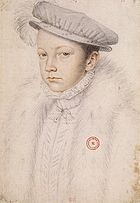 |
Francis II of France Francis II of France Francis II was aged 15 when he succeeded to the throne of France after the accidental death of his father, King Henry II, in 1559. He reigned for 18 months before he died in December 1560... |
Henry II of France Henry II of France Henry II was King of France from 31 March 1547 until his death in 1559.-Early years:Henry was born in the royal Château de Saint-Germain-en-Laye, near Paris, the son of Francis I and Claude, Duchess of Brittany .His father was captured at the Battle of Pavia in 1525 by his sworn enemy,... (Valois) |
19 January 1544 | 24 April 1558 | 5 December 1560 | Mary I | |||
 |
Henry Stuart Henry Stuart, Lord Darnley Henry Stewart or Stuart, 1st Duke of Albany , styled Lord Darnley before 1565, was king consort of Scotland and murdered at Kirk o'Field... |
Matthew Stewart, 4th Earl of Lennox Matthew Stewart, 4th Earl of Lennox Matthew Stewart, 4th Earl of Lennox was the 4th Earl of Lennox, and leader of the Catholic nobility in Scotland. He was the son of John Stewart, 3rd Earl of Lennox. His grandson was James VI of Scotland.... (Stuart Stewart of Darnley Stewart of Darnley was a notable Scots family, a branch of the House of Stewart, who provided the English Stuart monarchs with their male-line Stuart descent, after the reunion of their branch with the royal Scottish branch, which led to the ultimate union of the two main kingdoms of Great Britain:... ) |
7 December 1545 | 29 July 1565 | 9/10 February 1567 | ||||
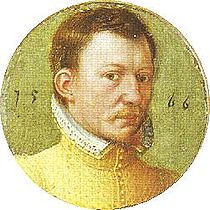 |
James Hepburn, 4th Earl of Bothwell James Hepburn, 4th Earl of Bothwell James Hepburn, 1st Duke of Orkney , better known by his inherited title as 4th Earl of Bothwell, was hereditary Lord High Admiral of Scotland. He is best known for his association with and subsequent marriage to Mary, Queen of Scots, as her third husband... |
Patrick Hepburn, 3rd Earl of Bothwell Patrick Hepburn, 3rd Earl of Bothwell Patrick Hepburn, 3rd Earl of Bothwell , was the son of Adam Hepburn, Lord Hailes, who died at the Battle of Flodden the year after Patrick's birth.Hepburn was known as the Fair Earl... (Hepburn) |
c.1534 | 15 May 1567 | 24 July 1567 Wife's abdication |
14 April 1578 | |||
| Anne of Denmark Anne of Denmark Anne of Denmark was queen consort of Scotland, England, and Ireland as the wife of King James VI and I.The second daughter of King Frederick II of Denmark, Anne married James in 1589 at the age of fourteen and bore him three children who survived infancy, including the future Charles I... |
Frederick II of Denmark Frederick II of Denmark Frederick II was King of Denmark and Norway and duke of Schleswig from 1559 until his death.-King of Denmark:Frederick II was the son of King Christian III of Denmark and Norway and Dorothea of Saxe-Lauenburg. Frederick II stands as the typical renaissance ruler of Denmark. Unlike his father, he... (Oldenburg House of Oldenburg The House of Oldenburg is a North German dynasty and one of Europe's most influential Royal Houses with branches that rule or have ruled in Denmark, Russia, Greece, Norway, Schleswig, Holstein, Oldenburg and Sweden... ) |
12 December 1574 | 23 November 1589 | 17 May 1590 | 2 March 1619 | James VI James I of England James VI and I was King of Scots as James VI from 24 July 1567 and King of England and Ireland as James I from the union of the English and Scottish crowns on 24 March 1603... |
|||
 |
Henrietta Maria of France Henrietta Maria of France Henrietta Maria of France ; was the Queen consort of England, Scotland and Ireland as the wife of King Charles I... |
Henry IV of France Henry IV of France Henry IV , Henri-Quatre, was King of France from 1589 to 1610 and King of Navarre from 1572 to 1610. He was the first monarch of the Bourbon branch of the Capetian dynasty in France.... (Bourbon House of Bourbon The House of Bourbon is a European royal house, a branch of the Capetian dynasty . Bourbon kings first ruled Navarre and France in the 16th century. By the 18th century, members of the Bourbon dynasty also held thrones in Spain, Naples, Sicily, and Parma... ) |
25 November 1609 | 13 June 1625 | 30 January 1649 | 10 September 1669 | Charles I Charles I of England Charles I was King of England, King of Scotland, and King of Ireland from 27 March 1625 until his execution in 1649. Charles engaged in a struggle for power with the Parliament of England, attempting to obtain royal revenue whilst Parliament sought to curb his Royal prerogative which Charles... |
||
| Picture | Name | House | Birth | Marriage | Became consort | Coronation | Ceased to be consort | Death | Spouse |
House of Stuart (restored) (1660–1707)
In 1660, Charles II, son of the executed Charles I, was restored to the thrones of England, Scotland and Ireland, and Stuart rule began again. James VII, his brother, was overthrown in 1688–89 because of his Catholic faith; his daughters, Mary II and Anne, were the last Stuarts to rule in the British Isles, Anne dying in 1714. The Kingdom of Scotland, however, had already ceased to exist in 1707, when the Act of Union amalgamated the Kingdoms of England and Scotland into a united Kingdom of Great Britain. James VII's son, James Francis Edward StuartJames Francis Edward Stuart
James Francis Edward, Prince of Wales was the son of the deposed James II of England...
, refusing to accept the Act of Union, claimed the English and Scottish thrones, as did his son Charles Edward Stuart
Charles Edward Stuart
Prince Charles Edward Louis John Casimir Sylvester Severino Maria Stuart commonly known as Bonnie Prince Charlie or The Young Pretender was the second Jacobite pretender to the thrones of Great Britain , and Ireland...
; however, they are not considered legitimate Kings of Scotland, since they never effectively secured their claims, and so their wives are not listed here.
| Picture | Name | House | Birth | Marriage | Became Consort | Coronation | Ceased to be Consort | Death | Spouse |
|---|---|---|---|---|---|---|---|---|---|
 |
Catherine of Braganza Catherine of Braganza Catherine of Braganza was a Portuguese infanta and queen consort of England, Scotland and Ireland as the wife of King Charles II.She married the king in 1662... |
John IV of Portugal John IV of Portugal |-|John IV was the King of Portugal and the Algarves from 1640 to his death. He was the grandson of Catherine, Duchess of Braganza, who had in 1580 claimed the Portuguese crown and sparked the struggle for the throne of Portugal. John was nicknamed John the Restorer... (Braganza House of Braganza The Most Serene House of Braganza , an important Portuguese noble family, ruled the Kingdom of Portugal and its colonial Empire, from 1640 to 1910... ) |
25 November 1638 | 21 May 1662 | 6 February 1685 | 31 December 1705 | Charles II Charles II of England Charles II was monarch of the three kingdoms of England, Scotland, and Ireland.Charles II's father, King Charles I, was executed at Whitehall on 30 January 1649, at the climax of the English Civil War... |
||
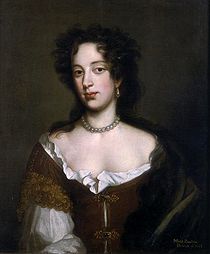 |
Mary of Modena Mary of Modena Mary of Modena was Queen consort of England, Scotland and Ireland as the second wife of King James II and VII. A devout Catholic, Mary became, in 1673, the second wife of James, Duke of York, who later succeeded his older brother Charles II as King James II... |
Alfonso IV d'Este, Duke of Modena (Este) |
5 October 1658 | 30 September 1673 | 6 February 1685 | 11 December 1688 | 7 May 1718 | James VII James II of England James II & VII was King of England and King of Ireland as James II and King of Scotland as James VII, from 6 February 1685. He was the last Catholic monarch to reign over the Kingdoms of England, Scotland, and Ireland... |
|
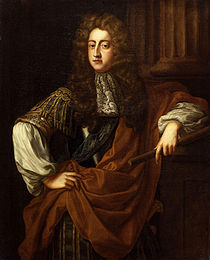 |
George of Denmark | Frederick III of Denmark Frederick III of Denmark Frederick III was king of Denmark and Norway from 1648 until his death. He instituted absolute monarchy in Denmark and Norway in 1660, confirmed by law in 1665 as the first in western historiography. He was born the second-eldest son of Christian IV of Denmark and Anne Catherine of Brandenburg... (Oldenburg House of Oldenburg The House of Oldenburg is a North German dynasty and one of Europe's most influential Royal Houses with branches that rule or have ruled in Denmark, Russia, Greece, Norway, Schleswig, Holstein, Oldenburg and Sweden... ) |
2 April 1653 | 28 July 1683 | 8 March 1702 | 1 May 1707 Kingdom of Scotland abolished; Anne becomes Queen regnant of the Kingdom of Great Britain, George royal consort of the same |
28 October 1708 | Anne Anne of Great Britain Anne ascended the thrones of England, Scotland and Ireland on 8 March 1702. On 1 May 1707, under the Act of Union, two of her realms, England and Scotland, were united as a single sovereign state, the Kingdom of Great Britain.Anne's Catholic father, James II and VII, was deposed during the... |
|
| Picture | Name | House | Birth | Marriage | Became consort | Coronation | Ceased to be consort | Death | Spouse |
For the subsequent consorts of Great Britain and the United Kingdom, see List of British consorts.
Stuart pretenders, 1689-1824
Despite the deposition of James II in 1689, he and his descendants continued to claim the thrones of England, Scotland, and Ireland for more than a century afterwards. This claim was, when politically suitable, recognized by some other European monarchs. As the Stuart pretenders considered the government of England after 1688 to be illegitimate, they did not recognize the validity of the union of the English and Scottish crowns in 1707, or the union with Ireland in 1801.| Picture | Arms | Name | Father | Birth | Marriage | Became Consort | Coronation | Ceased to be Consort | Death | Spouse |
|---|---|---|---|---|---|---|---|---|---|---|
 |
 |
Mary of Modena Mary of Modena Mary of Modena was Queen consort of England, Scotland and Ireland as the second wife of King James II and VII. A devout Catholic, Mary became, in 1673, the second wife of James, Duke of York, who later succeeded his older brother Charles II as King James II... |
Alfonso IV, Duke of Modena Alfonso IV d'Este Alfonso IV d'Este was Duke of Modena and Reggio from 1658 until his death. He was the father of Mary of Modena, consort of James II of England.-Biography:... (Este) |
5 October 1658 | 30 September 1673 (by proxy) | 6 February 1685 husband's accession |
23 April 1685 | 16 September 1701 husband's death |
7 May 1718 | James VII |
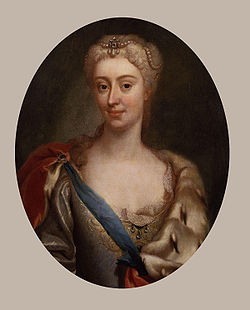 |
Maria Clementina Sobieska | James Louis Sobieski (Sobieski Sobieski family Sobieski family of Janina coat of arms, also known as House of Sobieski due to their royalty connections, were a notable family of Polish nobility. According to the family's legend, disproved by modern historians, it traced its lineage to Polish duke, Leszek II the Black... ) |
18 July 1702 | 3 September 1719 | None | 18 January 1735 | "James VIII" James Francis Edward Stuart James Francis Edward, Prince of Wales was the son of the deposed James II of England... |
|||
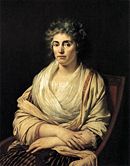 |
Louise of Stolberg Princess Louise of Stolberg-Gedern Princess Louise Maximilienne Caroline Emmanuele of Stolberg-Gedern was the wife of the Jacobite claimant to the English and Scottish thrones Charles Edward Stuart... |
Gustav Adolf of Stolberg-Gedern | 20 September 1752 | 28 March 1772 (by proxy)14 April 1772 | None | 3 April 1784 separation31 January 1788 husband's death |
29 January 1824 | "Charles III" Charles Edward Stuart Prince Charles Edward Louis John Casimir Sylvester Severino Maria Stuart commonly known as Bonnie Prince Charlie or The Young Pretender was the second Jacobite pretender to the thrones of Great Britain , and Ireland... |
||

